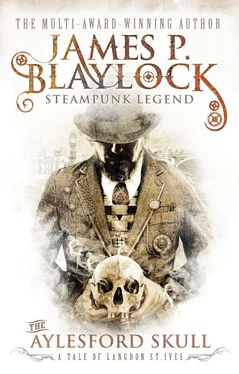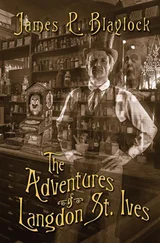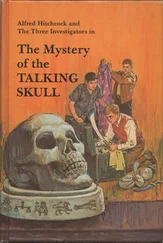James Blaylock - The Aylesford Skull
Здесь есть возможность читать онлайн «James Blaylock - The Aylesford Skull» весь текст электронной книги совершенно бесплатно (целиком полную версию без сокращений). В некоторых случаях можно слушать аудио, скачать через торрент в формате fb2 и присутствует краткое содержание. Жанр: sf_stimpank, на английском языке. Описание произведения, (предисловие) а так же отзывы посетителей доступны на портале библиотеки ЛибКат.
- Название:The Aylesford Skull
- Автор:
- Жанр:
- Год:неизвестен
- ISBN:нет данных
- Рейтинг книги:5 / 5. Голосов: 1
-
Избранное:Добавить в избранное
- Отзывы:
-
Ваша оценка:
- 100
- 1
- 2
- 3
- 4
- 5
The Aylesford Skull: краткое содержание, описание и аннотация
Предлагаем к чтению аннотацию, описание, краткое содержание или предисловие (зависит от того, что написал сам автор книги «The Aylesford Skull»). Если вы не нашли необходимую информацию о книге — напишите в комментариях, мы постараемся отыскать её.
The Aylesford Skull — читать онлайн бесплатно полную книгу (весь текст) целиком
Ниже представлен текст книги, разбитый по страницам. Система сохранения места последней прочитанной страницы, позволяет с удобством читать онлайн бесплатно книгу «The Aylesford Skull», без необходимости каждый раз заново искать на чём Вы остановились. Поставьте закладку, и сможете в любой момент перейти на страницу, на которой закончили чтение.
Интервал:
Закладка:
“My God,” Hasbro said, his usual equanimity shattered. “They’ve blown a hole in the wall of the Fleet River, I believe. There’s a torrent pouring out of the breach and washing down Farringdon Street, sweeping everything before it.”
St. Ives craned his neck, watching the floodwaters rage along toward the Thames, carrying away wagons and horses that had been coming up toward the market. People fled away on every side, broken wagons washing up against the buildings along the street. The flood and debris must have been making a din, for people some distance ahead of the waters climbed up onto whatever high ground afforded itself, others ran east or west, if they were lucky enough to be near an intersection. St. Ives had rarely felt as useless, for there was nothing he could do to help except pray that people could find their way clear.
Blackfriars Bridge arched over the Thames ahead of them. Behind them the smoke had thinned, blowing away on the breeze. The flood showed no sign of abating, which was odd. In fact, now that St. Ives considered it, the flood itself was odd. It was true that the waters of the Fleet came down from high elevation in Hampstead Heath, as did most of the underground rivers, and that they were very near the surface in Smithfield, but even so, what explained their sudden issuance? The explosion alone wouldn’t answer. The collapse of the tunnel, perhaps? – the Fleet simply blocked?
The papers would blame anarchists, as ever. It was perilously simple to cast blame into the open pit of anarchy and have done with speculation. They crossed the river to the south shore, and then came around again, looking back toward Smithfield. The flow was diminished now, the river apparently having resumed its course after its ten minutes of wild freedom. But what had caused the cessation? The force of the waters might perhaps have cleared away the debris…
“The explosion in the Ranelagh Sewer was much the same,” St. Ives said. “Too much the same to be mere coincidence, it seems to me.”
“Your men got out along the embankment in that instance, I believe?”
“I’m fairly certain of it. Train the glass on the river’s edge, if you will – there where the waters of the Fleet issue out. There seems to be activity there.” The waters were much diminished, it seemed to St. Ives, although the flow was perhaps strengthening again.
“I have them in the lens now, sir. Two toshers, from the look of it, one of them a child. No, a dwarf, a bearded dwarf. There’s a barred door in the face of the Embankment, but the gate stands open. The dwarf pushes a barrow with a lantern.”
The blimp descended, St. Ives anxious to see the way of things. The two might easily be the same two who had effected the explosion at the Bayswater Club, especially given that they were trundling a barrow – an element too eccentric to be meaningless. It was possible, of course, that they were mere sewer hunters who had brought a cart along to haul their finds.
“They’ve taken an interest in us,” Hasbro said.
St. Ives got a good look at the pair now, although he could tell nothing much from it. When he had gone into the Ranelagh Sewer beneath the Bayswater Club, he hadn’t been able to see the face of his attacker. The dwarf was gesticulating, apparently arguing with his companion, pointing toward the airship. If they were mere toshers, illegally scavenging in the sewers, they would scarcely fear an airship, which could do damn-all to inconvenience them. They weren’t dressed like toshers, either. The thin man wore a bright-blue flannel coat, gaudy shoes, and a straw boater, as if he were spending a holiday at the seaside.
Suddenly the dwarf leapt forward and pushed his barrow along the embankment toward the cover of the bridge, the thing bouncing and swerving. He glanced back at the airship, and was evidently fleeing. The barrow gave a leap, skidded sideways, and fell, the front panel of the enclosure popping upward. What appeared to be an iron kettle bounded off and rolled toward the Thames, bouncing once and then flying in an arc from the lower terrace. Its lid flew off as it described a short arc out over the river before plunging in. A whiff of white vapor ascended at the point where the waters closed over the kettle, and immediately there was a pool of liquid fire floating on the surface of the river in the shadow of the bridge. The dwarf’s companion caught up with him now and cuffed him about the head, the dwarf warding off the blows. They soon gave it up, righted the barrow, and went on their hurried way, disappearing beneath the bridge.
The airship passed over, hundreds of people atop the bridge pointing skyward now. The two men and their barrow were nowhere to be seen, and they could easily skulk away into London from the shelter of the bridge. There was nothing to be done about any of it. As for St. Ives and Hasbro, their way lay to the east, and the sooner the better. St. Ives shifted the wheel to port, the airship carrying them around the newly constructed Cathedral of the Oxford Martyrs. From the air it appeared to be a preciously slender cast-iron framework around plate-glass rectangles, less sturdily constructed, it seemed to St. Ives, than the gondola in which he sat. The structure was built in the manner of the Crystal Palace, although considerably smaller. To St. Ives it looked something like the head of an Aberdeen terrier, but without any of the dog’s virtues. Although Gladstone had condemned the cathedral as a silly piece of egotistic rubbish, the papers touted it as a marvel of its type, another of the grand architectural achievements of Victoria’s reign. It would officially open with great ceremony sometime soon – an event that failed to interest St. Ives in the least, as did the political squabbling of the Queen and her prime minister.
“Is it the same pair that attacked you?” Hasbro asked.
“I’m compelled to believe that it is. If not the same two, then two from the same mold, surely. Anarchists, perhaps, although with strangely complicated methods. I wonder at the substance that was burning on the water.”
“Greek fire, I should think. It’s easily produced, ferociously hot.”
“But why go to the trouble of taking along so dangerous a substance?” St. Ives asked. “An infernal device is far easier to produce with mere gunpowder, and it creates its own explosion with a simple clockwork mechanism.”
“True,” Hasbro said. “Consider, however, that the bursting of the Fleet Sewer might be mere practice toward some greater end, where an infernal device wouldn’t serve.”
“Could it be coal dust that exploded?” St. Ives asked, the idea coming into his mind abruptly. “I know so little of coal dust, but Merton’s contraband coal raises the possibility, if this is indeed Narbondo’s handiwork.”
“Gilbert Frobisher is acquainted with the dangers of coal dust, sir, given that he’s made his fortune in smelting.”
“We’ll quiz the man when we have an opportunity. It seems quite possible that Narbondo is behind both explosions – weeks ago at the club and again today. Suppose they dispersed the dust into the air in a confined space and detonated it by casting Greek fire into its midst. Grain silos explode with tremendous force when a few pounds of suspended dust are empowered by a lucifer match. A palm house would go up in much the same manner, although I have no idea how much dust would be required. Could such a thing be done in a sewer, though?”
“Possibly,” Hasbro said. “There are chambers built into the walls of the tunnels at intervals. A dam built of coffer-work might deflect water into one of the chambers near a point where the river is particularly close to the surface. That same coffer-work might be constructed to allow the blockage of the chamber altogether, allowing for the dust to accumulate in a sufficient volume if it were pumped in. Certainly they’d have to find a chamber with a perilously thin outer wall to avoid blowing themselves up into the bargain, and at a point where the waters were very near the surface. Dangerous work, sir, with a great deal of labor involved, no doubt – immense preparation. Keeping the work hidden from the flushers would be the greatest task, I should think. It would take practice to get it right, no doubt, as well as a close knowledge of the sewers, but such a thing could be done if one had sufficient time and resources – funds to bribe the right parties.”
Читать дальшеИнтервал:
Закладка:
Похожие книги на «The Aylesford Skull»
Представляем Вашему вниманию похожие книги на «The Aylesford Skull» списком для выбора. Мы отобрали схожую по названию и смыслу литературу в надежде предоставить читателям больше вариантов отыскать новые, интересные, ещё непрочитанные произведения.
Обсуждение, отзывы о книге «The Aylesford Skull» и просто собственные мнения читателей. Оставьте ваши комментарии, напишите, что Вы думаете о произведении, его смысле или главных героях. Укажите что конкретно понравилось, а что нет, и почему Вы так считаете.










